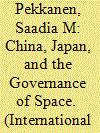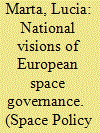| Srl | Item |
| 1 |
ID:
189484


|
|
|
|
|
| Summary/Abstract |
China and Japan are among the world’s top space powers, with significant technical competence in both conventional and ‘newspace’ capabilities. Since the early 1990s, each country has also taken a keen interest in shaping the governance of outer space activities. But they have done so in remarkably different ways, calling into question Asian states’ supposed preferences for soft and informal institutions. Japan has led the Asia-Pacific Regional Space Agency Forum, involving both state and nonstate participants, which is guided by a set of principles. China has opted for a high-profile formal intergovernmental design, the Asia-Pacific Space Cooperation Organization, with a Convention and all the trappings of a formal organizational structure. This article assesses the activities of China and Japan in the new space race, discusses how and why the design of their space governance differs, and reflects on prospects for competition and cooperation.
|
|
|
|
|
|
|
|
|
|
|
|
|
|
|
|
| 2 |
ID:
120652


|
|
|
|
|
| Publication |
2013.
|
| Summary/Abstract |
The governance of space activities in Europe remains an open question, even more so since the adoption of the Lisbon Treaty, and the latest EC document and ESA declaration have revived the debate. This paper considers the strengths and weaknesses of the current governance model, and compares recent French, German, Italian and UK national documents in order to highlight their vision of space governance in Europe. Some elements of agreement emerge but, more interestingly, this comparison highlights their differences, especially with regard to the role of the EU as a supranational actor in the space domain.
|
|
|
|
|
|
|
|
|
|
|
|
|
|
|
|